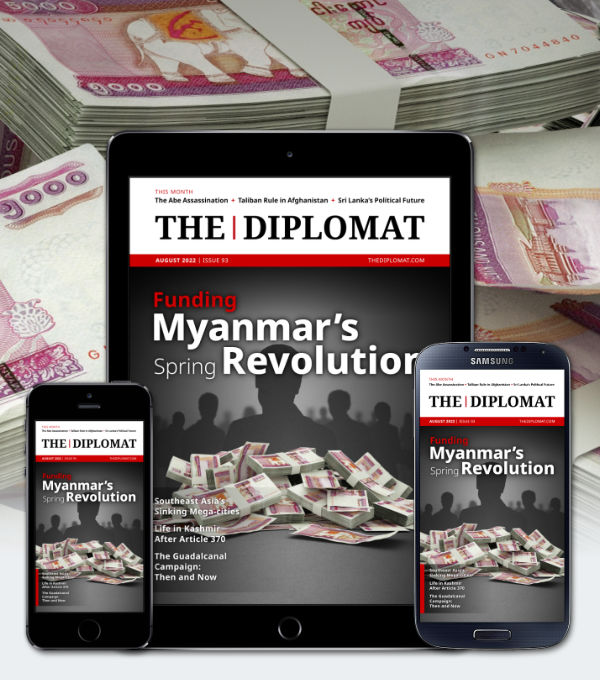| Welcome to the latest issue of Diplomat Brief. This week our top story revisits one of the earliest known cases of a Chinese lobbying campaign targeting U.S. state legislators. We also have an interview with journalist Andrew Quilty, author of the book “August in Kabul: America’s Last Days in Afghanistan.” |
| Story of the week |  | Politics China and California: The Anatomy of a PRC Subnational Lobbying CampaignWhat Happened: In 2009, Chinese diplomats moved aggressively to lobby against a pro-Tibet resolution tabled in the California State Assembly. Despite a similar resolution passing without controversy the previous year, the resolution proposed in 2009 failed amid what several key participants at the time called “unprecedented” efforts by the Chinese consulate to prevent its passage. Our Focus: The history is worth revisiting as a marker of a new phase in China’s diplomacy, including more aggressive efforts to influence U.S. state lawmakers. After he introduced the resolution, then-California State Assemblyman Sam Blakeslee reported receiving a visit from Chinese diplomats, who attempted to persuade him to scrap the deal. He wasn’t the only one the PRC reached out to; representatives from the Chinese Consulate in San Francisco descended on the state capitol building to urge Assembly members to vote against the resolution, in what all sources interviewed for the piece agreed was a “very unusual” or even “unprecedented” move. An FBI agent even visited the capitol to warn certain legislators about the campaign: the agent “said that we have seen an ‘unprecedented’ amount of activity from the Chinese foreign ministry, directed at influencing the California legislature,” then-Assembly member Chuck DeVore recalled. “What I took from that was this happens to Washington, D.C. But they had never seen anything like this at the state level.” What Comes Next: Blakeslee’s resolution eventually failed, after Democratic leadership in the Assembly pushed to have it referred back to committee rather than facing a floor vote. To Blakeslee, the entire incident seemed to be a disturbing story of a successful lobbying operation from the PRC. China certainly claimed victory, highlighting the resolution’s defeat and its diplomats’ efforts to that end in state media reporting, although Democratic lawmakers at the time denied they had been pressured by the Chinese government over the issue. The saga of the Tibet resolution is an important case study of China’s early foray into subnational influence campaigns. Read this story |
| Behind the News | INTERVIEW Andrew QuiltyAndrew Quilty, a long-time Afghanistan-based journalist and author of the book “August in Kabul: America’s Last Days in Afghanistan,” on the possibility of a more moderate Taliban regime this time around: “There are elements within the Taliban who are more reformist minded than their more conservative founders, many of whom still hold sway leadership positions. However, I think, by now, it's clear that the Taliban's pre-takeover conciliatory rhetoric was just that: rhetoric.” Read the interview |
| This Week in Asia | Northeast Asia Taiwan’s New Ministry of Digital Affairs OpensTaiwan’s newest government ministry, the Ministry of Digital Affairs, will set up shop as of August 27. With that, Audrey Tang will officially become Taiwan’s first digital minister, after bearing the formal title of “minister without portfolio” for years. What the new ministry will actually do, however, remains unclear. Find out more | South Asia Imran Khan Faces Terrorism Charges, Possible ArrestIn Pakistan, police have filed terrorism charges against former Prime Minister Imran Khan, the latest move by authorities to tamp down on Khan’s campaign to oppose the government that ousted him – and its backers in the security establishment. Khan could be arrested later this week, which his supporters have promised would kick off mass protests across the country. Find out more | Southeast Asia Former Malaysian PM Loses 1MDB AppealOn Tuesday, Malaysia's top court upheld a corruption conviction and 12-year prison sentence against former Prime Minister Najib Razak for his involvement in the pilfering of the state fund 1MDB. In 2020, Najib was found guilty of abuse of power, criminal breach of trust, and money laundering for illegally receiving $9.4 million from a former unit of 1MDB. After judges threw out Najib’s final appeal, the 69-year-old became the first Malaysian leader to be sent to prison – an outcome that will give hope to Malaysians fighting corruption at the highest levels of the country’s politics. Find out more | Central Asia More Technical Difficulties for the Caspian Pipeline ConsortiumCracks in air-filled buoyancy tanks, part of the systems that fill tankers with oil exported from Kazakhstan and Russia, have reportedly led to the suspension of filling at two of three mooring points near the port of Novorossiysk. It’s another setback for Kazakhstan’s crude oil exports, 80 percent of which are carried through the CPC system. Find out more |
| Visualizing APAC |  | Source: John Hopkins University Coronavirus Resource Center A handful of Asia-Pacific countries are forging a “third way” on living with COVID-19, showing much reduced mortality rates without draconian lockdowns. See the full picture |
| Word of the Week | Environment NullahUrdu for a drainage channel or waterway. Clogging or narrowing of nullahs is a major cause of perennial flooding in Pakistan’s urban centers. Find out more |
| Webinar | The Diplomat Asks Where Does China-US Trade Go From Here?We are now four years into the so-called trade war between China and the U.S., with no end in sight. If anything, trade tensions have only grown as the competition for technology dominance intensifies and both the U.S. and China seek to accelerate economic “decoupling” from a major rival. What does all this mean for the future of China-U.S. trade? Is decoupling really desirable — or even possible? How will broader geopolitical tensions impact trade talks (and trade volumes) between the two countries? Join us on August 31 at 8 a.m. U.S. Eastern / 8 p.m. China Standard Time for a discussion about the future of China-U.S. trade relations in an era of increasing tensions. Co-hosted by The Diplomat and Intellisia Institute. Sign up for the webinar |
|  |




